英语人教版八年级上册第九单元
人教版英语八年级上第九单元知识点

Unit 9 Can you come to my party?一、单词及短语1、prepare 动词意为使…做好准备,把…准备好;常用短语①prepare for……为…做准备;其名词形式是preparation 意为准备,准备工作Eg:I can’t go to your party ,because I must prepare for the math exam.The farmers are preparing the ground for planting。
农民们正在为种植准备耕地。
②prepare sb for/to do sth 使某人对……做好准备eg:The teachers are preparing the students for the final examination.老师们正让学生们准备期末考试.He took out a picec of paper and prepared to write to his friend.他拿出一张纸,准备给他的朋友写信。
③prepare sb sth 为某人准备……eg:the host prepared us a delicious meal.主人为我们准备了美味的晚餐.2、exam examination 名词意为考试常见的短语:entrance exam 入学考试pass the exam 通过考试fail the exam 考试及格have /take an exam 参加考试3、have the flu 患感冒have a cold 感冒了have a fever 发高烧have a headache 头痛注意:其中的have不是有的意思,通常意为患有……4、available 形容词意为有空的;可获得的,和free的意义相同be available===be freeEg:I am available (free)in this afternoon. 下午有空。
人教版英语八年级上册unit9canyoucometomyparty单元语法

人教版英语八年级上册unit9canyoucometomyparty单元语法单元语法小专题(Grammar Focus)语法精讲情态动词can的用法1.can是情态动词,没有人称和数的变化,但有时态的变化,它的过去式为could,其后可直接接动词原形,其用法如下:(1)表示能力,意为“能,会”。
如:Can you swim?你会游泳吗?Can you answer the question?你能回答这个问题吗?(2)表示许可,意为“可以”,相当于may(比may更口语化,may较正式)。
此外,could也可以表示许可,语气更加委婉。
如:Can/May I come in?我可以进来吗?Can you help me?你能帮我吗?You may go home now.你现在可以回家了。
Could you help me find it?你能帮我找到它吗?(3)用于提出邀请。
对其作肯定回答通常用“Sure./Of course./Certainly./Yes,I'd love to.”等,作否定回答通常用“Sorry/No,I can't.”等。
如:—Can he come to my party?他能来参加我的派对吗?—Yes.He'd love to.是的。
他很乐意。
—Can you go to the baseball game?你能去看棒球比赛吗?—Sorry,I can't.对不起,我不能。
(4)用于否定句或疑问句中,表示推测。
如:Mr.Wang can't be at home.王老师不可能在家里。
2.can的句式变化(1)在变否定句时,直接在后面加上“not”,写作can't或cannot。
如:I can speak French.我会讲法语。
→I can't speak French.我不会讲法语。
(2)在变一般疑问句时,can直接移到主语前(原主语的首字母改成小写,第一人称应变为第二人称)即可。
新版人教版英语八年级上册Unit9 单词讲解 PPT
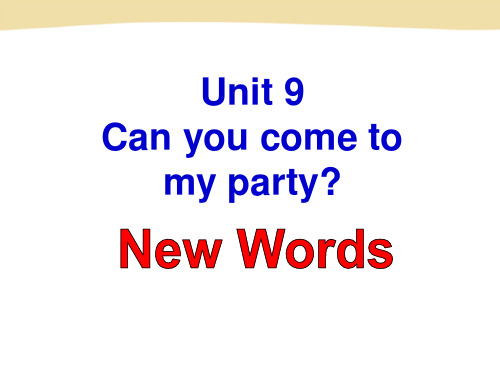
• the day before yesterday前天 • the day after tomorrow后天
flu
• • • • • n.流行性感冒,流感; 复数:flus Mary has the flu. 玛丽得流感了。 Can bird flu be treated? 禽流感可以治疗吗?
available
• Adj. 有空的,可获得的 • Can you come to my party on Saturday night? • I’m sorry. I’m not available.(我没有空。)
look forward to
• 期望,盼望 • 例如: I look forward to a lively discussion. • 我期待着一场热烈的讨论。 • look forward to doing sth • 例如: • I am looking forward to hearing from you. • 我期盼着你们能来信。
hang
• 过去式:hung hanged • 过去分词:hung hanged • 现在分词:hanging
• v. 悬挂,垂下 • The walls were hung with huge modern paintings. • 墙上挂着巨幅的现代画。 • hang out 闲逛,常去某处 相关搭配:hang out with 与…出去玩
• 例如:This column appeared in print on February 2,
最全面人教版八年级上册英语第九单元知识点归纳总结
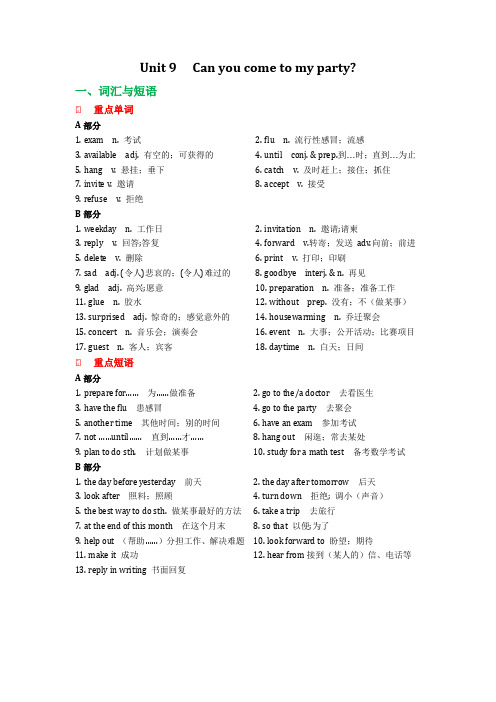
Unit 9 Can you come to my party?一、词汇与短语● 重点单词A部分1.exam n. 考试2.flu n. 流行性感冒;流感3.available adj. 有空的;可获得的4.until conj. & prep.到…时;直到…为止5.hang v. 悬挂;垂下6.catch v. 及时赶上;接住;抓住7.invite v. 邀请8.accept v. 接受9.refuse v. 拒绝B部分1.weekday n. 工作日2.invitation n. 邀请;请柬3.reply v. 回答;答复4.forward v.转寄;发送adv.向前;前进5.delete v. 删除6.print v. 打印;印刷7.sad adj. (令人)悲哀的;(令人)难过的8.goodbye interj. & n. 再见9.glad adj. 高兴;愿意10.preparation n. 准备;准备工作11.glue n. 胶水12.without prep. 没有;不(做某事)13.surprised adj. 惊奇的;感觉意外的14.housewarming n. 乔迁聚会15.concert n. 音乐会;演奏会16.event n. 大事;公开活动;比赛项目17.guest n. 客人;宾客18.daytime n. 白天;日间● 重点短语A部分1.prepare for…… 为……做准备2.go to the/a doctor 去看医生3.have the flu 患感冒4.go to the party 去聚会5.another time 其他时间;别的时间6.have an exam 参加考试7.not ……until…… 直到……才……8.hang out 闲逛;常去某处9.plan to do sth. 计划做某事10.study for a math test 备考数学考试B部分1.the day before yesterday 前天2.the day after tomorrow 后天3.look after 照料;照顾4.turn down 拒绝; 调小(声音)5.the best way to do sth. 做某事最好的方法6.take a trip 去旅行7.at the end of this month 在这个月末8.so that 以便;为了9.help out (帮助……)分担工作、解决难题10.look forward to 盼望;期待11.make it 成功12.hear from接到(某人的)信、电话等13.reply in writing 书面回复● 重点句子A部分1.--Can you come to my party on Saturday? --Sure, I'd love to.--周六你能来参加我的聚会吗?--当然,我想来。
人教版八年级上册英语第九单元课件 Section B 2a2d(PPT32张)
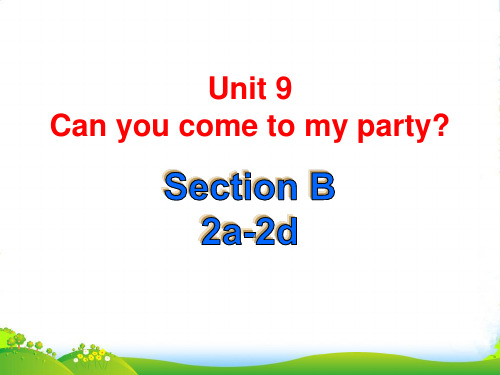
What kinds of parties do we have?
What kinds of parties do we have? birthday party
What kinds of parties do we have? housewarming party
Ms. Steen very much. She helped to improve h_i_s_E_n__g_li_sh_
so much. He’s _sa__d_ to see her go, and this party is t_h_e__b_e_s_t__w_a_y_ to say “ _T_h_a_n_k_y_o_u_a_n_d__g_o_od_b_y_e_ .” He
2c Read the messages again and answer the questions.
1. What kind of party is it? _It_’_s_a__su_r_p_r_i_s_e_p_a_r_t_y_. __________
2. Who is the party for? _I_t’_s_f_o_r_M__s_._S_t_e_en__. _____________
We are planning a _p__a_rt_y__ at our new house this Saturday. Can you _c_o_m__e__? Our house is at 2 London Road. We are serving _f_o_o_d__ and _d_r_i_n_k_s__ from 7:30 p.m. Please _b__ri_n_g___ your friends and family. A party is more _in_t_e_r_es_t_in__g with more people! Please let us __k__n_o_w___ by Wednesday ___if___ you can come to the party. Hope you can make it!
人教版初中英语八年级上册第九单元can you come to my party 教材分析
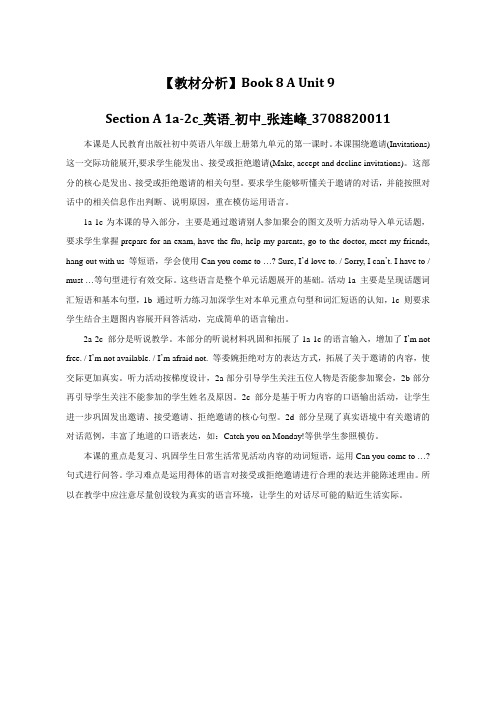
【教材分析】Book 8 A Unit 9Section A 1a-2c_英语_初中_张连峰_3708820011 本课是人民教育出版社初中英语八年级上册第九单元的第一课时。
本课围绕邀请(Invitations)这一交际功能展开,要求学生能发出、接受或拒绝邀请(Make, accept and decline invitations)。
这部分的核心是发出、接受或拒绝邀请的相关句型。
要求学生能够听懂关于邀请的对话,并能按照对话中的相关信息作出判断、说明原因,重在模仿运用语言。
1a-1c为本课的导入部分,主要是通过邀请别人参加聚会的图文及听力活动导入单元话题,要求学生掌握prepare for an exam, have the flu, help my parents, go to the doctor, meet my friends, hang out with us 等短语,学会使用Can you come to …? Sure, I’d love to. / Sorry, I can’t. I have to / must …等句型进行有效交际。
这些语言是整个单元话题展开的基础。
活动1a 主要是呈现话题词汇短语和基本句型,1b 通过听力练习加深学生对本单元重点句型和词汇短语的认知,1c 则要求学生结合主题图内容展开问答活动,完成简单的语言输出。
2a-2c 部分是听说教学。
本部分的听说材料巩固和拓展了1a-1c的语言输入,增加了I’m not free. / I’m not available. / I’m afraid not. 等委婉拒绝对方的表达方式,拓展了关于邀请的内容,使交际更加真实。
听力活动按梯度设计,2a部分引导学生关注五位人物是否能参加聚会,2b部分再引导学生关注不能参加的学生姓名及原因。
2c部分是基于听力内容的口语输出活动,让学生进一步巩固发出邀请、接受邀请、拒绝邀请的核心句型。
人教版八年级上册英语-Unit-9单元知识点总结
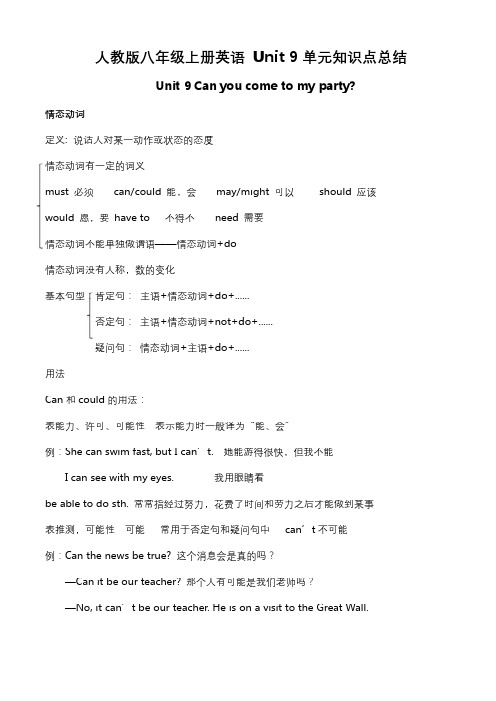
Unit 9 Can you come to my party? 情态动词定义: 说话人对某一动作或状态的态度情态动词有一定的词义must 必须can/could 能,会may/might 可以need 需要should 应该would 愿,要have to 不得不情态动词不能单独做谓语——情态动词+do情态动词没有人称,数的变化基本句型:肯定句:主语+情态动词+do+......否定句:主语+情态动词+not+do+......疑问句:情态动词+主语+do+......用法Can 和 could 的用法:表能力、许可、可能性表示能力时一般译为“能、会”例:She can swim fast, but I can’t.她能游得很快,但我不能I can see with my eyes. 我用眼睛看be able to do sth. 常常指经过努力,花费了时间和劳力之后才能做到某事表推测,可能性可能常用于否定句和疑问句中can’t不可能例:Can the news be true? 这个消息会是真的吗?—Can it be our teacher? 那个人有可能是我们老师吗?—No, it can’t be our teacher. He is on a visit to the Great Wall.could 在疑问句中,表示委婉的语气,此时could 没有过去式的意思例:—Could I use your pen? 我能用一下你的钢笔吗?—Yes, you can.可以(用 could 问,不能用 could 答。
)may 和 might 的用法表请求、许可,比 can 正式例:May I borrow your bike? 我可以借你的自行车吗?You may go home now. 现在你可以回家了表推测,谈论可能性可能,或许一般用于肯定句中may not 翻译为“可能不”例:It may rain tomorrow. 明天可能会下雨She may be at home. 她可能在家呢may 的过去式为 might ,表示推测时。
人教版八年级英语上册第九单元重点短语
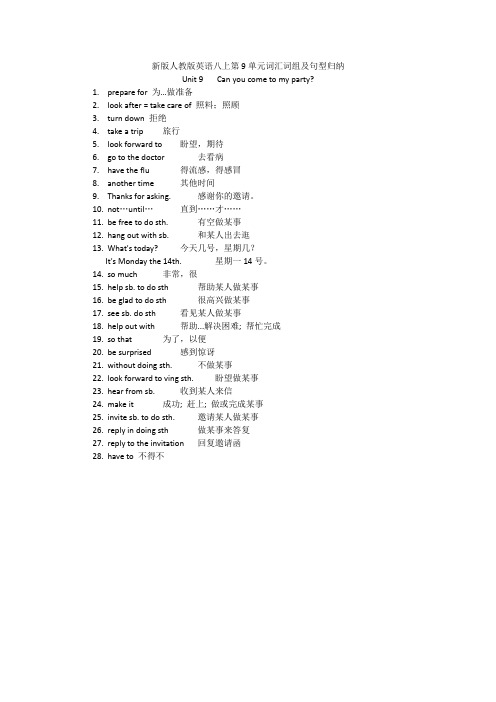
新版人教版英语八上第9单元词汇词组及句型归纳Unit 9 Can you come to my party?1.prepare for 为…做准备2.look after = take care of 照料;照顾3.turn down 拒绝4.take a trip 旅行5.look forward to 盼望,期待6.go to the doctor 去看病7.have the flu 得流感,得感冒8.another time 其他时间9.Thanks for asking. 感谢你的邀请。
10.not…until…直到……才……11.be free to do sth. 有空做某事12.hang out with sb. 和某人出去逛13.What's today? 今天几号,星期几?It's Monday the 14th. 星期一14号。
14.so much 非常,很15.help sb. to do sth 帮助某人做某事16.be glad to do sth 很高兴做某事17.see sb. do sth 看见某人做某事18.help out with 帮助...解决困难; 帮忙完成19.so that 为了,以便20.be surprised 感到惊讶21.without doing sth. 不做某事22.look forward to ving sth. 盼望做某事23.hear from sb. 收到某人来信24.make it 成功; 赶上; 做或完成某事25.invite sb. to do sth. 邀请某人做某事26.reply in doing sth 做某事来答复27.reply to the invitation 回复邀请函28.have to 不得不。
- 1、下载文档前请自行甄别文档内容的完整性,平台不提供额外的编辑、内容补充、找答案等附加服务。
- 2、"仅部分预览"的文档,不可在线预览部分如存在完整性等问题,可反馈申请退款(可完整预览的文档不适用该条件!)。
- 3、如文档侵犯您的权益,请联系客服反馈,我们会尽快为您处理(人工客服工作时间:9:00-18:30)。
Unit 9 Have you ever been to an amusement park?课型:新授执笔:王秋伶审核:邳文娟时间:2010年6月第一课时 Grammar teachingTeaching goals:1.现在完成时的定义,构成及用法。
2 学会运用have/has been to......谈论曾经去过的地方。
Learning: 语法现在完成时I. 用法(1)现在完成时表示过去发生的动作对现在的影响I have studied English. 表示I know a little English.He has already come back. 表示He is here now.常与already, yet, just, recently, ever, never, before等表示不确定时间的时间状语连用。
(2)现在完成时表示从过去一直持续到现在的动作或状态。
She has been ill for 3 days.He has worked in the bank since 1990.此时,句中谓语动词通常是延续性动词,且常与表示一段时间的时间状语连用。
如:these days, all this year, recently, for +时间段以及since+时间点等等。
II. 构成:have / has +动词过去分词(1)has用于主语是第三人称单数,have用于其它人称(2)动词的过去分词构成分为规则动词和不规则动词。
规则动词在词尾加ed,其规则与过去式一样。
不规则动词要记住。
例如:take-taken, go-gone等。
III. 肯定式、否定式和疑问式1) I have received a special gift.I have not received any special gift.I have never received any special gift.Have you received any special gift? Yes, I have. / No, I haven’t.2) He has ever played golf.He has not played golf.He has never played golf.Has he ever played golf? Yes, he has. / No, he hasn’t.随堂练习:一写出下列动词的过去式及过去分词。
1 go _____ ______2 work______ _______3 dance______ ______4 give_____ _______5 study______ _______6 read ______ _______7 visit______ ______8 see _______ _______9 get ______ ________二句型转换1He has learned English for 5 years.(1)_____ he _____ English for 5 years? Yes, ____ _____. No, _____ ______.(2) ______ ______ _______ he ______ English?2 We began to learn English three years ago. (改为同义句)We English three years.3 I have read the book twice.(否定句)I ______read the book twice.4 I (work) here since I (move) here in 1999.IV. have been (to)和have gone(to)的区别:“have been (to)”指“去过某地”,说话时此人已经不在那里,已经回来、侧重指经历。
I have been to America. 我去过美国。
“have gone (to)”指“已经去了某地”,说话时此人在那里,或可能在路上,反正不在这里。
He has gone to America. 他已经去了美国。
V. 一般过去时,现在完成进行时和现在完成时的区别一般过去时只表示过去的一个动作或状态,和现在不发生联系。
现在完成时是用一个过去的动作说明现在的情况。
He lived in Beijing in 2000. 只说明他2000年住在北京,他目前住在哪里并不清楚。
He has lived in Beijing since 2000.说明他自从2000年就住在北京,他目前还住在北京。
现在完成时和现在完成进行时都可以表示“从过去开始一直持续到现在”这一概念,有时两者可以互相代用,但前者多用于口语。
在含义上如着重表示动作的结果时,多用现在完成时;如着重表示动作一直在进行,即动作的延续性或者动作仍然继续下去时,则多用现在完成进行时。
如:a. I have written six letters since breakfast.从吃早饭到现在我写了六封信。
I have been writing letters since breakfast.从吃早饭到现在我一直在写信。
b. I have read this book.我读过这本书。
I have been reading this book.我一直在读这本书。
1 John ______Beijing .He is still there.A has been toB has gone toC go toD goes to2 ---May I speak to John? ---Sorry,he_____Japan.But he_____in two days.A has been to; will come backB has gone to ;will be backC has been in; would come backD has gone to; won’t come back小结:_____________________________________________________________第二课时section A 1a----2cTeaching some new words and the listening practice.一、New words learning:1.amusement 娱乐,消遣I only do it for amusement.我只是做着玩的。
an amusement park 游乐园2 neither 两者都不,反义词为both1)形容词,放在单数名词之前:Neither answer is right.2)代词,Neither of the room is warm.--Which would you like,tea or coffee?--Neither.I like milk.3)用于倒装结构中,即neither+be动词、情态动词或助动词+主语结构--I haven’t seen this film. –Me,neither.--Did you see him? --Neither did I.二、Do the listening practice 1b 2a 2b,then students practice the conversation in pairs.(69页2c) 小结:_____________________________________________________________第三课时 3a-4Teaching goals:1. 谈论过去的事情和经历及其感受2. 学会用have / has been to …谈论曾经去过的地方一、 New words learning:1.attraction 有吸引力的人或事物,其动词为attractThere are many attractions in the beautiful city.2 theme 主题1)the theme of 意为......的主题:The theme of the picture is peace.这幅画的主题是和平。
2) a theme park 主题公园3.end up 以......结束The party ended up at 12:00 last night.晚会昨晚12点结束。
Let’s end up our party with a song.让我们以一首歌结束我们的晚会。
4.especially 特别,尤其Noise is unpleasant,especially when you are trying to sleep.噪音令人讨厌,特别是当你想睡的时候。
二 Read 3a and finish the tasks.三 PairworkA: Have you ever traveled to another province?B:Yes,I have.小结:_____________________________________________________________第四课时 Section B 1a-2cTeaching goals:1.一般过去时,现在完成进行时和现在完成时的区别2. 了解国外的风情和文化一 New words teaching:1. exchange n 交流,交换They are giving an exchange of houses.他们在交换房屋。
v 交换,互换常用结构exchange sth for sth 或 exchange sth with sb He exchanged a blue sweater for a red one.他把蓝毛衣换成了红色的。
Ann exchanged seats with Ben.exchange student 交换生2. discover v 发觉,发现Columbus discovered America.哥伦布发现了新大陆。
They discovered an oil field.他们发现了一个油田。
n discovery 发觉,发现3 guide n 导游 tour guide 导游二 Read 3a and answer the questions on page 72.Key sentences:1 All I ever wanted to do was travel.我曾想做的一切就是旅行。
2 I discovered that the most important requirement was to speak English well.我发现最重要的条件就是说好英语。
